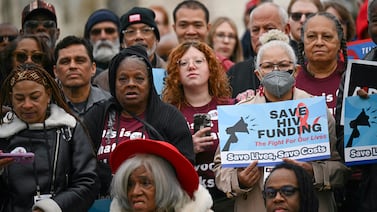Public health, explained: Sign up to receive Healthbeat’s free Atlanta newsletter here.
The Georgia Department of Public Health is limiting the availability of several adult vaccines for uninsured patients at local health departments through at least January.
The limits apply to most immunizations offered by county health agencies — shots that prevent pathogens like hepatitis A, human papillomavirus, and shingles. Childhood vaccinations are not affected by the change, nor are local supplies of Covid-19 and influenza vaccines, said Cobb and Douglas Public Health Deputy Director of Clinical Operations Lauren Cedor.
Through local health agencies like Cobb and Douglas, Georgia’s health department provides vaccines for many uninsured adults at less than $22 — significantly cheaper than an out-of-pocket price of a vaccine like hepatitis B, which GoodRx says has an average retail price of $107. It’s the type of service health experts say is crucial for maintaining a healthy public.
Cedor told the Cobb County Board of Health at Thursday’s meeting that instead of sending the number of uninsured adult vaccines the department ordered, the Georgia health department will send only 10 doses per month of most immunizations. Cobb and Douglas vaccinates over 2,500 kids and adults each month, and it administered about 230 hepatitis B vaccines to uninsured adults in October and November.
“That’s going to meet about 9% of our demand,” she said of the limited supply.
Cobb and Douglas District Health Director Dr. Janet Memark told the board her agency would try to prioritize the highest immunization needs to protect uninsured residents from infectious disease spread. The Fulton County Board of Health confirmed the agency expects to face similar issues.
“This could impact our ability to meet the needs for vaccinations for uninsured and underinsured patients at all of our clinics,” Fulton spokesperson Darryl Carver said in a statement. “We are asking that our clients remain patient as we try to meet the demand for these valuable medications.”
Georgia Department of Public Health spokesperson Nancy Nydam told Healthbeat in an email that her agency is limiting its uninsured adult immunization distribution for a combination of reasons: pharmaceutical companies have increased vaccine prices; Hurricane Helene destroyed some stored doses; and the Centers for Disease Control and Prevention has recommended more adult immunizations over the past few years.
Nydam added that as these changes have happened, the funding state and federal lawmakers allocate for the adult vaccine program has remained flat. CDC director Mandy Cohen also highlighted this problem in a 2023 congressional report, writing that the federal program aimed at vaccinating uninsured adults was hundreds of millions of dollars short of what it needed to meet its public health goals.
Federal immunization funding for Georgia increased by about $9 million from fiscal year 2023 to 2024, but Nydam said most of that addition was earmarked for Covid-19 shots. The General Assembly has kept the state’s vaccine contribution at about $2.5 million for the last decade — down from around $11 million in 2009.
“Whether there will be additional funding for adult vaccines is uncertain,” Nydam said. She did not answer whether the state health department had requested additional funds from the state General Assembly or federal representatives.
If local health agency administrators wanted to request more doses of in-demand vaccines, they could choose to not offer other ones for adults without health insurance, Nydam said.
Dr. Harry Heiman, a clinical professor at the Georgia State University School of Public Health, called cuts to the state’s immunization efforts “penny wise, dollar foolish.” The cost of treating diseases like hepatitis B and meningitis is thousands of dollars more expensive than preventing them in the first place, and unrestricted infectious disease spread is a major public health threat.
“It’s a lose-lose,” he said.
Heiman emphasized that uninsured Georgians who seek vaccines at local health departments are often economically vulnerable, and cutting off their health care would likely further increase their risk of sickness and death. He said the Georgia General Assembly should look to use some of the state’s multibillion-dollar surplus to bolster the immunization program when it convenes for the 2025 regular legislative session.
Georgia Budget and Policy Institute Health Justice Director Leah Chan pointed out that federal and state Helene relief dollars should be able to restore vaccines lost in the hurricane. But she said the state vaccine limits are representative of what happens when problems arise and public health systems aren’t sufficiently funded.
“We are seeing how there are cracks in the infrastructure that make it challenging to move with the current,” she said.
After the December Cobb County Board of Health meeting, Cedor said the restrictions may soon create difficult decisions for her health department. But for now, she said the agency has enough shots to continue immunizing uninsured adults who need vaccines.
“This gives us a little bit of time to prepare so that we can serve them when they’re coming in and seeing us,” Cedor said. “We definitely hope that this is short lived.”
Allen Siegler is a reporter covering public health in Atlanta for Healthbeat. Contact Allen at asiegler@healthbeat.org.






